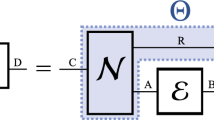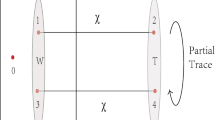Abstract
Immeasurability of a quantum state has important consequence in practical implementation of quantum computers. Our purpose is to analyze the efficiency of the entangled output of Pati-Braunstein deleting machine or Wootters-Zurek quantum copying machine as a quantum channel. Interestingly we find that for special values of the input parameter the state does not violate the Bell’s inequality. Moreover, we analyze the performances of the entangled output of Pati-Braunstein deleting after the Wootters-Zurek copying machine.
Similar content being viewed by others
References
Wootters W.K., Zurek W.H.: A single quantum cannot be cloned. Nature 299, 802 (1982)
Yuen H.P.: Amplification of quantum states and noiseless photon amplifiers. Phys. Lett. A 113, 405 (1986)
Duan L.M., Guo G.C.: A probabilistic cloning machine for replicating two non-orthogonal states. Phys. Lett. A 243, 261 (1998)
Duan L.M., Guo G.C.: Probabilistic cloning and identification of linearly independent quantum states. Phys. Rev. Lett. 80, 4999 (1998)
Pati A.K.: Quantum superposition of multiple clones and the novel cloning machine. Phys. Rev. Lett. 83, 2849 (1999)
Cerf N.: Asymmetric quantum cloning machines in any dimension. J. Mod. Opt. 47, 187 (2000)
Gisin N., Massar S.: Optimal quantum cloning machines. Phys. Rev. Lett. 79, 2153 (1997)
Bruß D., Ekert A., Macchavello C.: Optimal universal quantum cloning and state estimation. Phys. Rev. Lett. 81, 2598 (1998)
Bužek V., Hillery M.H.: Universal optimal cloning of arbitrary quantum states: from qubits to quantum registers. Phys. Rev. Lett. 81, 5003 (1998)
Fan H., Imai H., Matsumoto K., Wang X.-B.: Phase-covariant quantum cloning of qudits. Phys. Rev. A 67, 022317 (2003)
Sacchi M.F.: Phase-covariant cloning of coherent states. Phys. Rev. A 75, 042328 (2007)
Kay A., Kaszlikowski D., Ramanathan R.: Optimal cloning and singlet monogamy. Phys. Rev. Lett. 103, 050501 (2009)
Bartkiewicz K., Miranowicz A., Özdemir S.K.: Optimal mirror phase-covariant cloning. Phys. Rev. A 80, 032306 (2009)
Massar S., Popescu S.: Optimal extraction of information from finite quantum ensembles. Phys. Rev. Lett. 74, 1259 (1995)
Derka R., Bužek V., Ekert A.: Universal algorithm for optimal estimation of quantum states from finite ensembles via realizable generalized measurement. Phys. Rev. Lett. 80, 1571 (1998)
Dobšíček M., Johansson G., Shumeiko V., Wendin G.: Arbitrary accuracy iterative quantum phase estimation algorithm using a single ancillary qubit: a two-qubit benchmark. Phys. Rev. A 76, 030306(R) (2007)
García-Mata I., Shepelyansky D.L.: Quantum phase estimation algorithm in presence of static imperfections. Eur. Phys. J. D 47, 151–156 (2008)
Bennett C.H., Brassard G., Crépeau C., Jozsa R., Peres A., Wootters W.K.: Teleporting an unknown quantum state via dual classical and Einstein-Podolsky-Rosen channels. Phys. Rev. Lett. 70, 1895 (1993)
Szilard L.: Uber die Entropieverminderung in einem thermodynamischen System bei Eingriffen intelligenter Wesen. Z.Phys 53, 840 (1929)
Landauer R.: Irreversibility and heat generation in the computing proce. IBM J. Res. Dev. 3, 183 (1961)
Zurek W.H.: Quantum cloning: Schrödinger’s sheep. Nature 404, 131 (2000)
Pati A.K., Braunstein S.L.: Impossibility of deleting an unknown quantum state. Nature 404, 164 (2000)
Pati A.K., Braunstein S.L.: Quantum no-deleting principle and some of its implications. arXiv:quant-ph/0007121v1
Bužek V., Hillery M.H.: Quantum copying: beyond the no-cloning theorem. Phys. Rev. A 54, 1844–1852 (1996)
Peres A.: Separability criterion for density matrices. Phys. Rev. Lett. 77, 1413 (1996)
Horodecki M., Horodecki P., Horodecki R.: Separability of mixed states: necessary and sufficient conditions. Phys. Lett. A 223, 1 (1996)
Author information
Authors and Affiliations
Corresponding author
Rights and permissions
About this article
Cite this article
Luo, MX., Deng, Y. Distort one qubit from copying and deleting. Quantum Inf Process 12, 1701–1717 (2013). https://doi.org/10.1007/s11128-012-0484-6
Received:
Accepted:
Published:
Issue Date:
DOI: https://doi.org/10.1007/s11128-012-0484-6




